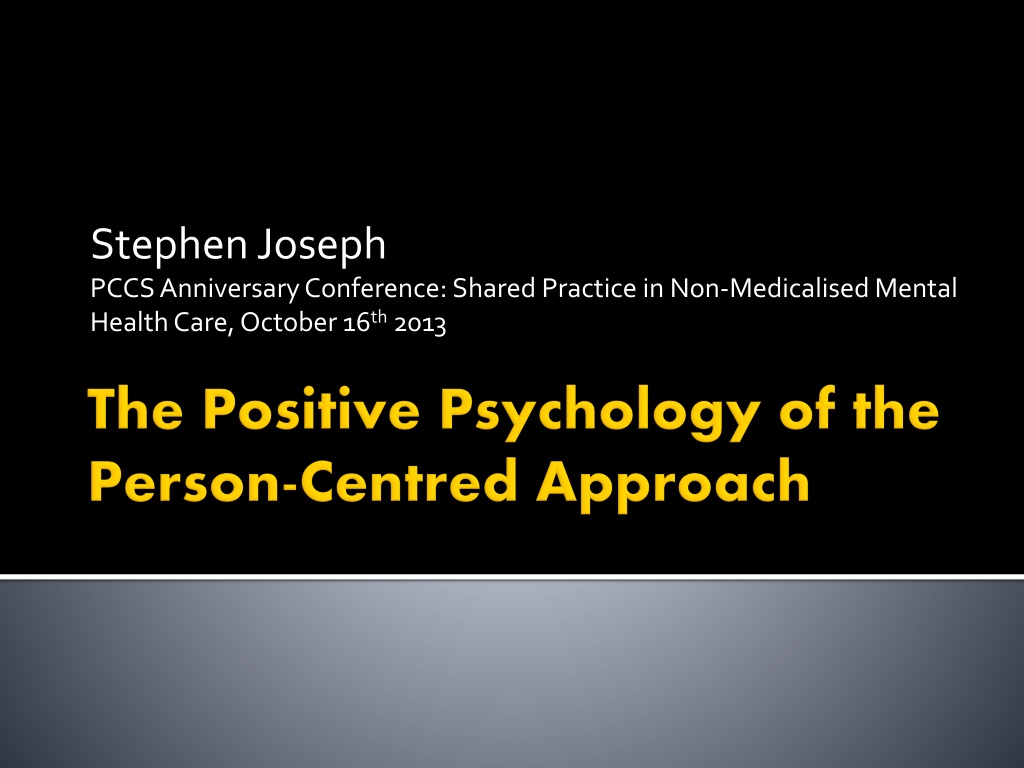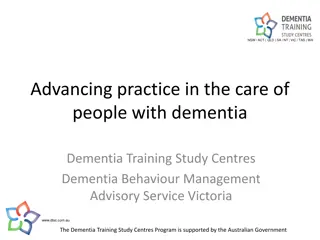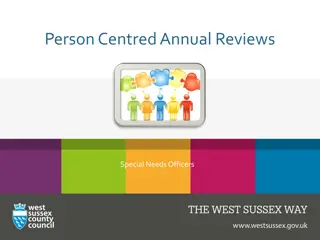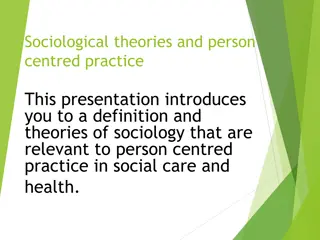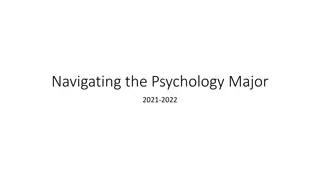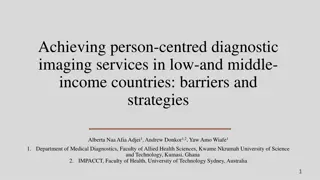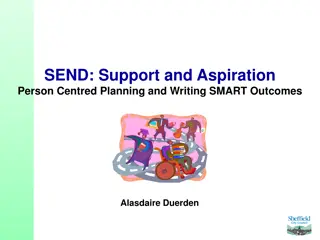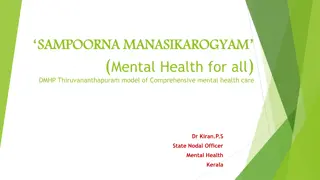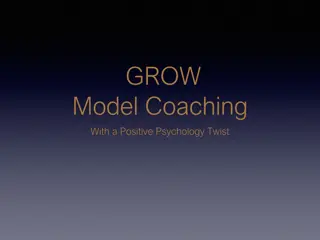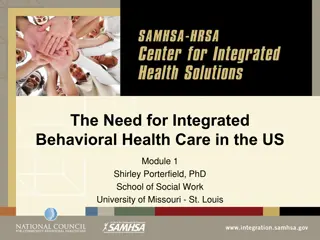Exploring Person-Centred Positive Psychology in Mental Health Care
Positive psychology aims to shift the focus from only treating negative aspects to fostering positive qualities in mental health care. This approach challenges the traditional illness ideology by emphasizing the full spectrum of functioning and promoting person-centred practices. Key topics include happiness, purpose, empathy, and forgiveness, highlighting the importance of holistic well-being in various contexts such as healthcare and the workplace.
Download Presentation

Please find below an Image/Link to download the presentation.
The content on the website is provided AS IS for your information and personal use only. It may not be sold, licensed, or shared on other websites without obtaining consent from the author. Download presentation by click this link. If you encounter any issues during the download, it is possible that the publisher has removed the file from their server.
E N D
Presentation Transcript
Stephen Joseph PCCS Anniversary Conference: Shared Practice in Non-Medicalised Mental Health Care, October 16th2013
The aim of positive psychology is to begin to catalyze a change in the focus of psychology from preoccupation only with repairing the worst things in life to also building positive qualities (Seligman & Csikszentmihalyi, 2000, p. 5)
Some topics of interest Some contexts of application Happiness Meaning Education Purpose Healthcare Gratitude Workplace Curiosity Clinical Empathy Self-help Hope Lifespan Flow Policy Forgiveness
In the past, mental health has been a residual concept the absence of disease. We need to do more than describe improvement in terms of say anxiety reduction . We need to say what the person can do as health is achieved. As the emphasis on pathology lessons, there have been a few recent efforts toward positive conceptualizations of mental health. Notable among these are Carl Rogers fully Functioning Person , A. Maslow s Self-Realizing Persons (Schlien, 2003/1956, p. 17) (Joseph, S., & Linley, P. A. (2006). Positive therapy: a meta-theoretical approach to positive psychological practice. Routledge: London.)
Open to experience Exhibit no defensiveness Interpret experience accurately Flexible self-concept Trust in own experiencing Develop values in accordance with experience Have no conditions of worth Experience unconditional positive self-regard Live in harmony with others Positive psychology is not necessarily person- centred, but the person- centred approach is always a positive psychology
Person-Centred Positive Psychology Challenges illness ideology Understanding the full spectrum of functioning Inform positive psychology practice Joseph, S., & Worsley, R. (Eds.). (2005). Person-centred psychopathology: A positive psychology of mental health. Ross-on-Wye: PCCS books. Worsley, R., & Joseph, S. (Eds.). (2007). Person centred practice: Case studies in positive psychology. Ross-on-Wye: PCCS books. Levitt, B. E. (Ed.), Reflections on human potential: bridging the person-centred approach and positive psychology. PCCS Books.
Patterson, T., Joseph, S. (2007). Outcome measurement in person-centred practice. In: Worsley, R., Joseph, S., eds. Person-centred practice: Case studies in positive psychology. PCCS Books, pp. 200-215.
Authenticity Scale Please read of the following statements and rate how well each describes you, where 1 = Does not Describe me at all and 7 = Describes me very well . 1 I think it is better to be yourself, than to be popular 2 I don t know how I really feel inside 3 I am strongly influenced by the opinions of others 4 I usually do what other people tell me to do 5 I always feel I need to do what others expect me to do 6 Other people influence me greatly 7 I feel as if I don t know myself very well 8 I always stand by what I believe in 9 I am true to myself in most situations 10 I feel out of touch with the real me 11 I live according to my values and beliefs 12I feel alienated from myself Wood, A. M., Linley, P. A., Maltby, J., Baliousis, M.., & Joseph, S. (2008). The authentic personality: A theoretical and empirical conceptualization and the development of the authenticity scale. Journal of Counselling Psychology, 55, 385-399. Scoring: total items 3, 4, 5, 6 for resistance to external influences; 2, 7, 10 and 12 for self-alienation; and items 1, 8, 9 and 11 for authentic behavior.
A number of statements that people have made to describe how they feel are given below. Please read each one and tick the box which best describes how frequently you felt that way in the past seven days, including today. Some statements describe positive feelings and some describe negative feelings. You may have experienced both positive and negative feelings at different times during the past seven days. Scoring For items 2, 4, and 5: Never = 0, Rarely = 1, Sometimes = 2, Often = 3 For items 1, 3, and 6: Never = 3, Rarely = 2, Sometimes = 1, Often 0 Add up all the scores. Lowest possible score is 0 and the highest is 18. Rationale Assesses well-being as a spectrum ranging from depressed state to a state of high functioning. Never Rarely Some- times Often Reference I felt dissatisfied with my life. I felt happy. I felt cheerless. I felt pleased with the way I am. I felt that life was enjoyable. I felt that life was meaningless. 1. 2. 3. Joseph, S., Linley, P. A., Harwood, J., Lewis, C. A., & McCollam, P. (2004). Rapid assessment of well-being: The short depression-happiness scale (SDHS). Psychology and Psychotherapy: Theory, Research and Practice, 77, 463-478. 4. 5. 6.
Email: Stephen.Joseph@nottingham.ac.uk Twitter: ProfSJoseph Blogs: http://www.psychologytoday.com/bl og/what-doesnt-kill-us http://www.huffingtonpost.com/step hen-joseph/what-doesnt-kill-us- post_b_2862726.html
